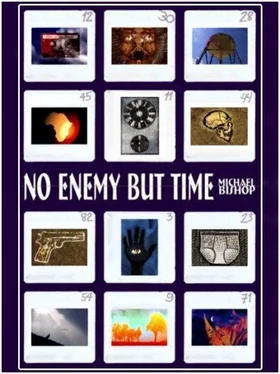Ladies and gentlemen, Beau Brummell is on his way.
How would I be received into that unlikely Eden? With open arms or bared bicuspids?
Praying that a pair of furry archangels with incandescent swords and naked backsides would not turn me away, I set off across the savannah. I moved lightly in my chukkas, ignoring the heat. A warthog, its tail inscribing an exclamation mark above the period of its bung, swerved from my path and disappeared backward into its burrow. Wildebeest eyed me warily for a portion of my trek, but returned to cropping grass when they saw that my destination lay elsewhere.
Several times, seeking shade in shallow arroyos or small acacia groves, I paused to rest. At length, however, I entered a tongue of gallery forest extending out of the hills onto the plain, and my adventure among the denizens of Eolithic Zarakal truly began.
Seville, Spain
Summer 1963
Twodays after Encarnación baptized her meddlesome neighbor with a shower of urine, the old woman’s grizzled, potbellied son accosted her on the gallery outside her apartment. This man’s name was Dionisio, and he was apparently a pharmacist’s superannuated delivery boy. For a grown man with a job he spent a great deal of time around the tenement complex, and Encarnación had often heard the neighborhood children derisively calling his name when he sauntered like a bedraggled peacock through the courtyard.
A wastrel, this Dionisio, with a life going the same unpromising direction as her own.
Today he grabbed her by the shoulders and spun her around to face him. His breath partook of a beery perfume, and chest hairs curled out of his shirt like so many popped packing threads. He was a man coming apart with rage; Encarnación half expected to see his shirt disintegrate and his fetid entrails come spilling out.
“Lay a curse on me!” he challenged her, tightening his grip on her shoulders. “I spit on your sorcery and your pride. How would you like to go over this rail, eh? How many would then gather to piss on your broken corpse?”
Dionisio began slapping Encarnación about. As he pummeled her, he treated her to an obscene catalogue of her faults. Finally, he delivered a stunning blow to her temple, caught her in his arms, and threw her to the gallery floor.
“But I’m not going to be imprisoned or killed for the pleasure of ending your sluttish life, you bitch. That would make you laugh from the grave, wouldn’t it? That would give you a voice with which to mock us. I know how you think.”
Squinting past the hematoma blooming beside her eye, Encarnación saw Dionisio’s chubby fingers unbuttoning his pants. Then her consciousness began filtering away. She heard a humiliating sibilance and felt an acrid warmth spreading through her skirts. Then she saw, heard, and felt nothing.
* * *
That night Encarnación Consuela Ocampo determined to do two things: to take up other lodgings and to wean her son. Long after the radios had been turned off and the run-amok children scolded into bed, she left the tenement carrying a bag of clothes and household items. The child had his usual place on her hip, and he rode wide-eyed through narrow alleys, past padlocked storefronts and bodegas. A milky sprawl of stars was visible overhead.
Their new residence was a condemned building not far from the mouth of Leoncillos Street. A row of timbers braced against the curb propped the façade of this derelict upright, and warning placards, which Encarnación could not read, stood in the building’s ground-floor fenestrae. She entered the foyer and, with an American-made bobby pin, sprang the lock on the ornate grate screening the stairs. Her son and her other burdens she then carried up three flights of steps to the empty sitting room of a desolate flat.
Here she deposited all her belongings but the child.
Before dawn she made three more trips through the labyrinthine alleys to their old apartment, never once abandoning her son in either place. Much of what she toted back to the condemned building was black-market merchandise, including nearly two dozen cartons of American cigarettes, a cache of wristwatches (Timex, Bulova, etc.), and several small electrical kitchen appliances. Once or twice, exhausted, she permitted the boy to pick his way over the cobblestones beside her, and he kept up remarkably well.
* * *
A month went by. The boy began drinking from a plastic cup that Encarnación bought for him in a department store called Gallerías Preciados, not far from the Calle de las Sierpes, Seville’s famous pedestrian thoroughfare. The milk—genuine leche de vaca —she purchased from vendors who rode their battered motorized carts past her building several times a day. She also bought oranges from fruit stalls in the neighborhood and gave her child the juice. Because she was purposely denying him her nipples, she tried to compensate by introducing him to such effervescent soft drinks as Coca-Cola and Fanta, which might not be good for him but which he greedily enjoyed. This strategy worked very well.
The boy soon ceased pestering her to present her breasts.
Another decision loomed for Encarnación. One day the city’s blue-collar henchmen would come to the building with a wrecking ball. What would happen after that? Her removal from the tenement complex had ruined her livelihood as a black-marketeer and prostitute, and what money she made nowadays came chiefly from doing errands for the owner of a nearby bodega and selling to his out-at-the-elbow customers the remainders of her cigarette and wristwatch inventories. If she should die, no one would appear to rescue her baby. And if she lived, she would have to find more lucrative work before the wrecking ball turned them out into the streets.
Her son was her joy and her martyrdom. Ever since their run-in with Dionisio’s mother, however, he had begun to change. First he had ceased vocalizing, almost as if aware that silence was the best means of preserving their squatters’ rights in the condemned building. Although he listened to the people jabbering on the sidewalk below their boarded balcony casements, he never tried to attract their attention with a hoot or a squeal. On trips into the streets on shopping errands, he habitually fixed his gaze on the lips of every speaking passerby or salesperson, but, Encarnación noticed, he did not attempt to emulate the sounds these people made. His fascination with the sequential sound patterns of human speech was entirely passive, and his mother began to fear that, having recognized her muteness, his infant mind had opted to achieve a similar state in himself.
The second change was in some ways even more worrisome. The child dreamed. These dreams, during which his eyelids flickered and his body thrashed, seemed to be especially vivid and captivating for one so young. Midnight horror shows. Morphean fantods. When his eyelids ceased jumping and his body lay perfectly still, the whites of his eyes showing like crescents of hard-boiled egg, Encarnación would panic and try to rouse him. Although he always came out of these swoons, they never failed to frighten her. She was afraid that her treatment of her son had mentally unbalanced him and that she had ruined his life forever. The final revenge of the vieja who had tormented her on the tenement rooftop was the accuracy of her analysis of the boy’s chances as an adult. Encarnación felt that she had doomed her son.
* * *
The highway to Santa Clara, the American housing area on the outskirts of Seville, was wide and desolate, the surrounding landscape forbidding under the summer moon. Encarnación, not without suffering and doubt, had made up her mind to brave the edge of this highway on foot.
Читать дальше



![Ally Carter - [Gallagher Girls 01] I'd Tell You I Love You But Then I'd Have to Kill You](/books/262179/ally-carter-gallagher-girls-01-i-d-tell-you-i-lo-thumb.webp)








